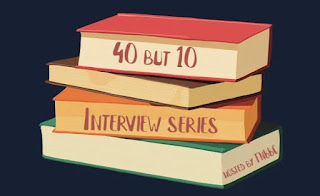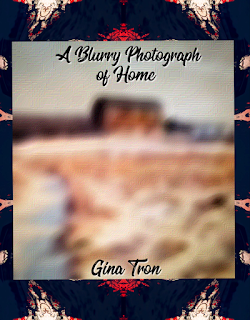I had retired the literary Would You Rather interview series, but didn't want to stop interviews on the site all together. Instead, I've pulled together 40ish questions - some bookish, some silly - and have asked authors to limit themselves to answering only 10 of them. That way, it keeps the interviews fresh and connectable for all of us!
Joining us today is Daniel A. Olivas. Daniel, the grandson of Mexican immigrants, was
born and raised near downtown Los Angeles. He is an award-winning author of
fiction, nonfiction, plays, and poetry including, How to Date a Flying
Mexican: New and Collected Stories (University of Nevada Press), and Things
We Do Not Talk About: Exploring Latino/a Literature through Essays and
Interviews (San Diego State University Press). Widely anthologized, he has
written on culture and literature for The New York Times, Los Angeles
Review of Books, Los Angeles Times, Alta Journal, Jewish
Journal, Zócalo, and The Guardian. Olivas received his degree
in English literature from Stanford University, and law degree from UCLA. By
day, Olivas is an attorney and makes his home in Southern California.
Why do you write?
Last summer, the Los Angeles Times published my essay where I explain that one of the driving forces behind desire to write was in response to the dearth of Latinx books on my school reading lists back in the 1960s and ‘70s. In another recent essay—this time published by Zocálo Public Square, I explained that finally decided to write fiction as an adult as a way to work through my grief that grew out of my wife’s multiple miscarriages. These two explanations are not contradictory, they are merely part of a whole. The end result is a writing life where I present the Mexican American and Chicano culture from my lived experience and perspective through fiction, poetry, plays and nonfiction. And let me add this: if I did not write, I would most assuredly lose my sanity. I write because I must. I have no choice in the matter.
What do you do when you’re not writing?
I love discovering old interviews of writers, actors and directors on YouTube. There are some real gems out there. One of my favorite interviewers is Dick Cavett who interviewed everyone from Janis Joplin to Orson Wells to Gore Vidal to Grouch Marx to Eartha Kitt. Cavett was not afraid to allow his guests ample time to explore what it means to be creative.
If you could have a superpower, what would it be?
In the title story of my latest short-story collection, How to Date a Flying Mexican (University of Nevada Press), a woman falls in love with a man who can levitate. I think deep down, that’s the superpower I want, otherwise why would I have explored it in fiction?
How do you celebrate when you finish writing a new book?
I begin a new writing project.
Describe your book in three words.
Magical. Strange. Mexican.
Describe your book poorly.
Safe. Comforting. Traditional.
What is your favorite book from childhood?
Alice’s Adventures in Wonderland by Lewis Carroll.
What are you currently reading?
The ARC of Yxta Maya Murray’s forthcoming novel, God Went Like That (Northwestern University Press).
What’s on your literary bucket list?
In 2020, I was selected for Circle X Theatre's inaugural Evolving Playwrights Group where I adapted my 2011 novel, The Book of Want, for the stage, culminating in a streamed reading in 2021. I would love to see this play—that I describe as a Chicano Our Town—in a fully staged production. Adventurous producers may read my play at the New Play Exchange.
What is under your bed?
El Diablo, of course.
~~~~~~~~~~~~~~~~~~~~~~~~~~~~~~~~~~~~~~~~~~~~~~~~
How to Date a Flying Mexican is a collection of stories derived from Chicano and Mexican culture but ranging through fascinating literary worlds of magical realism, fairy tales, fables, and dystopian futures. Many of Daniel A. Olivas’s characters confront—both directly and obliquely—questions of morality, justice, and self-determination. The collection is made up of Olivas’s favorite previously published stories, along with two new stories—one dystopian and the other magical— that challenge the Trump administration’s anti-immigration rhetoric and policies. How to Date a Flying Mexican draws together some of Olivas’s most unforgettable and strange tales, allowing readers to experience his very distinct, and very Chicano, fiction.
The Spanish translation of How to Date a Flying Mexican will be released by the same publisher (University of Nevada Press) under the title Cómo Salir Con Un Mexicano Voladoron on May 22, 2023
Link for purchase of How to Date a Flying Mexican:










.jpeg)









